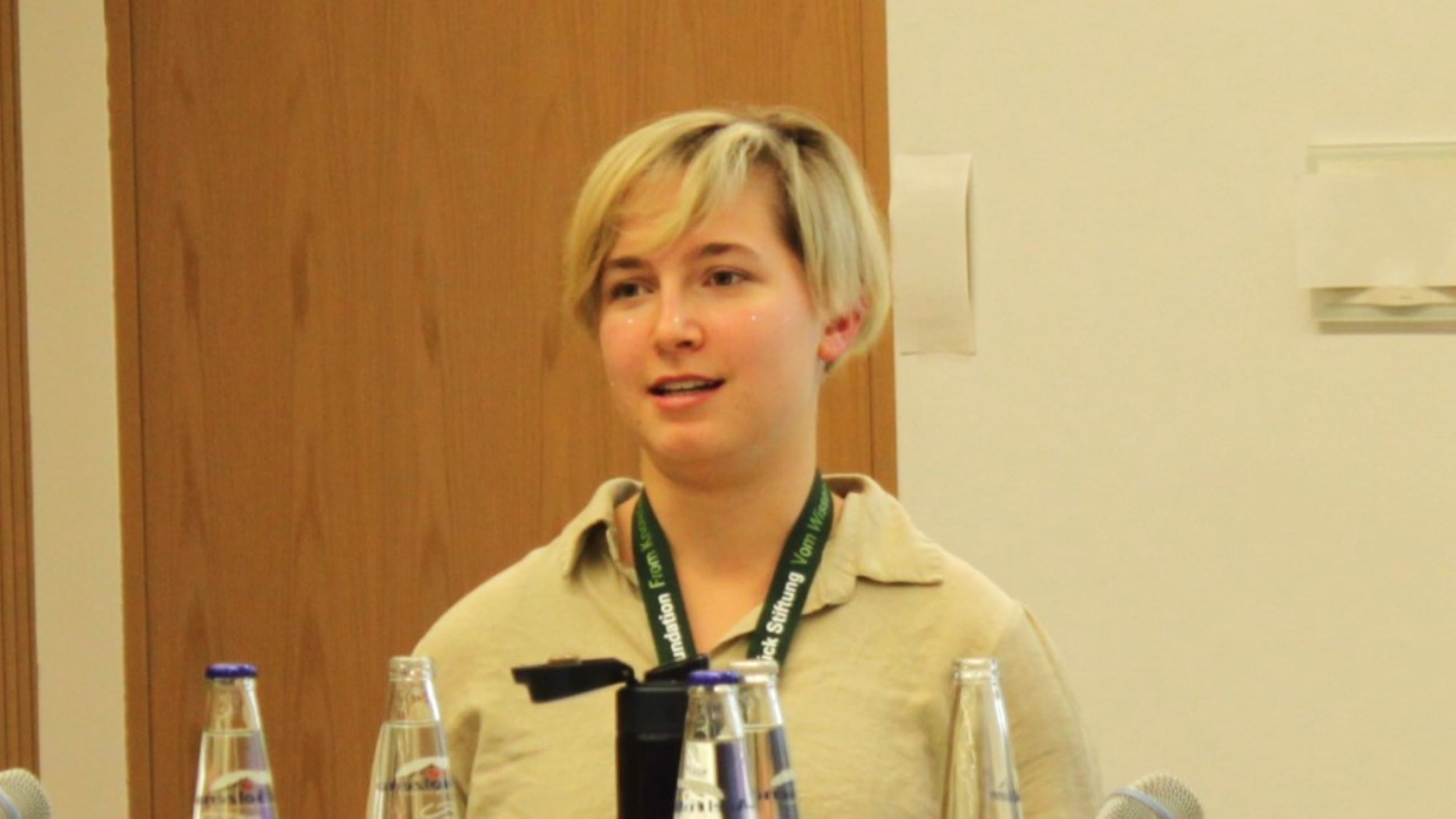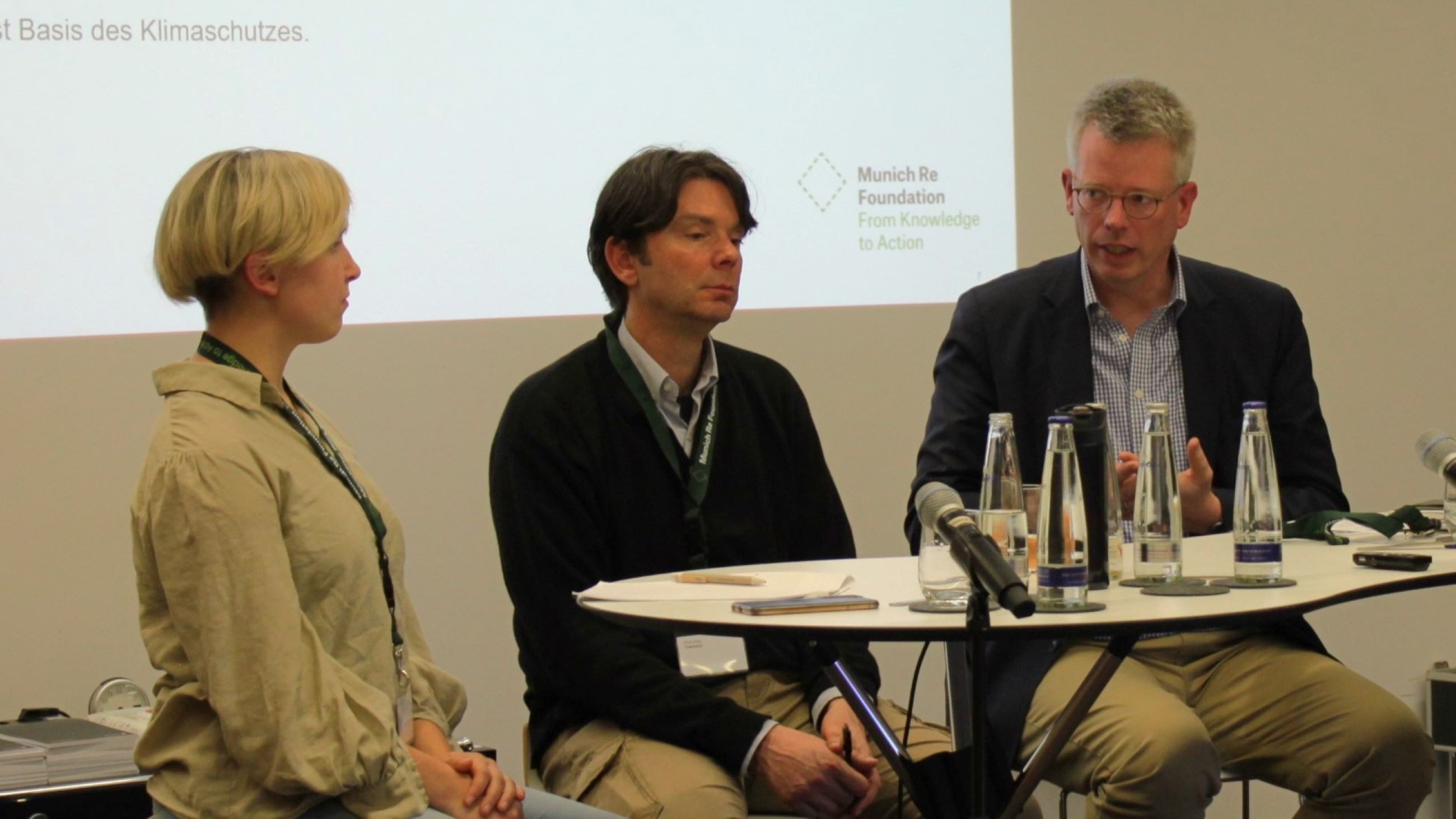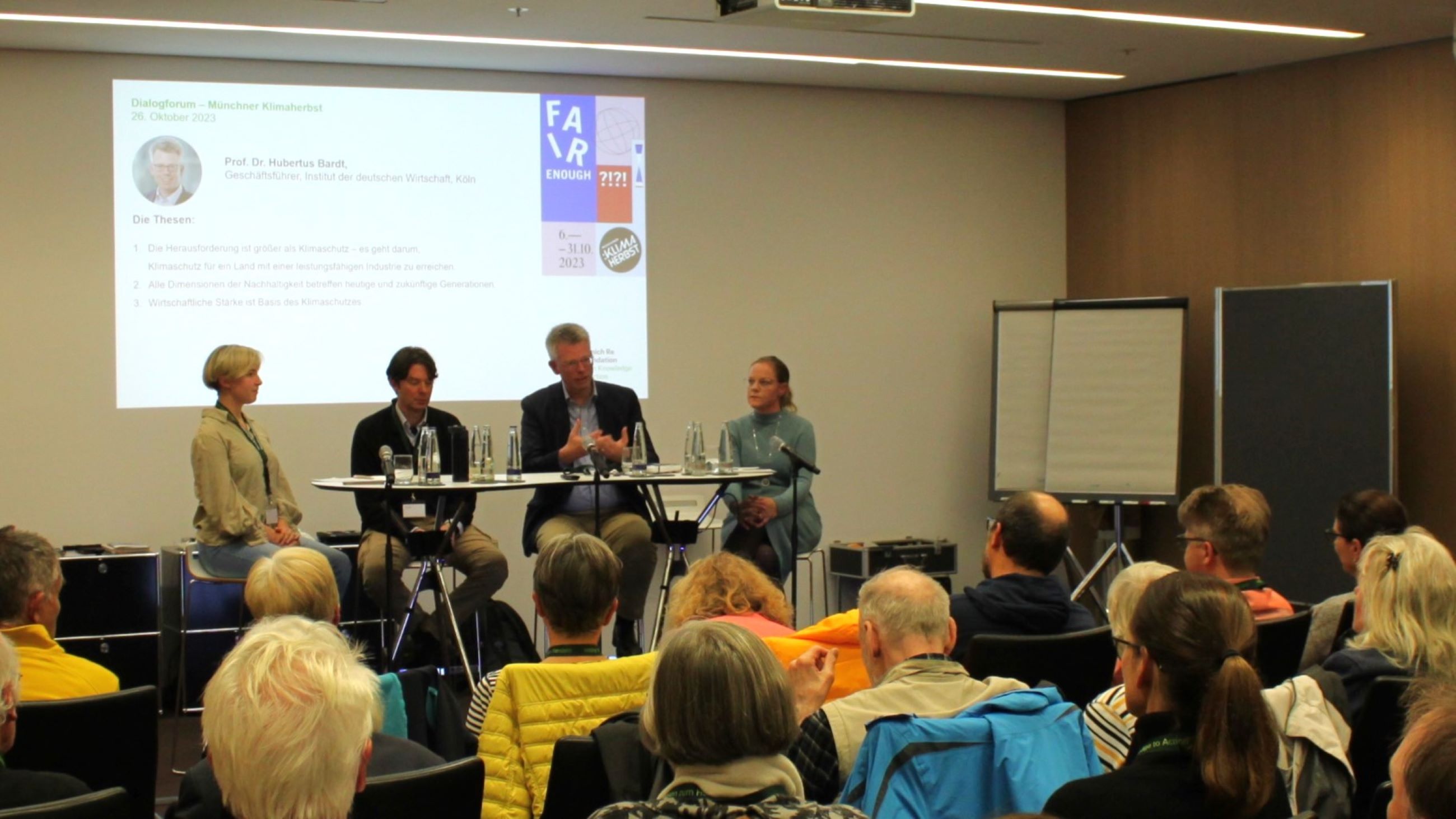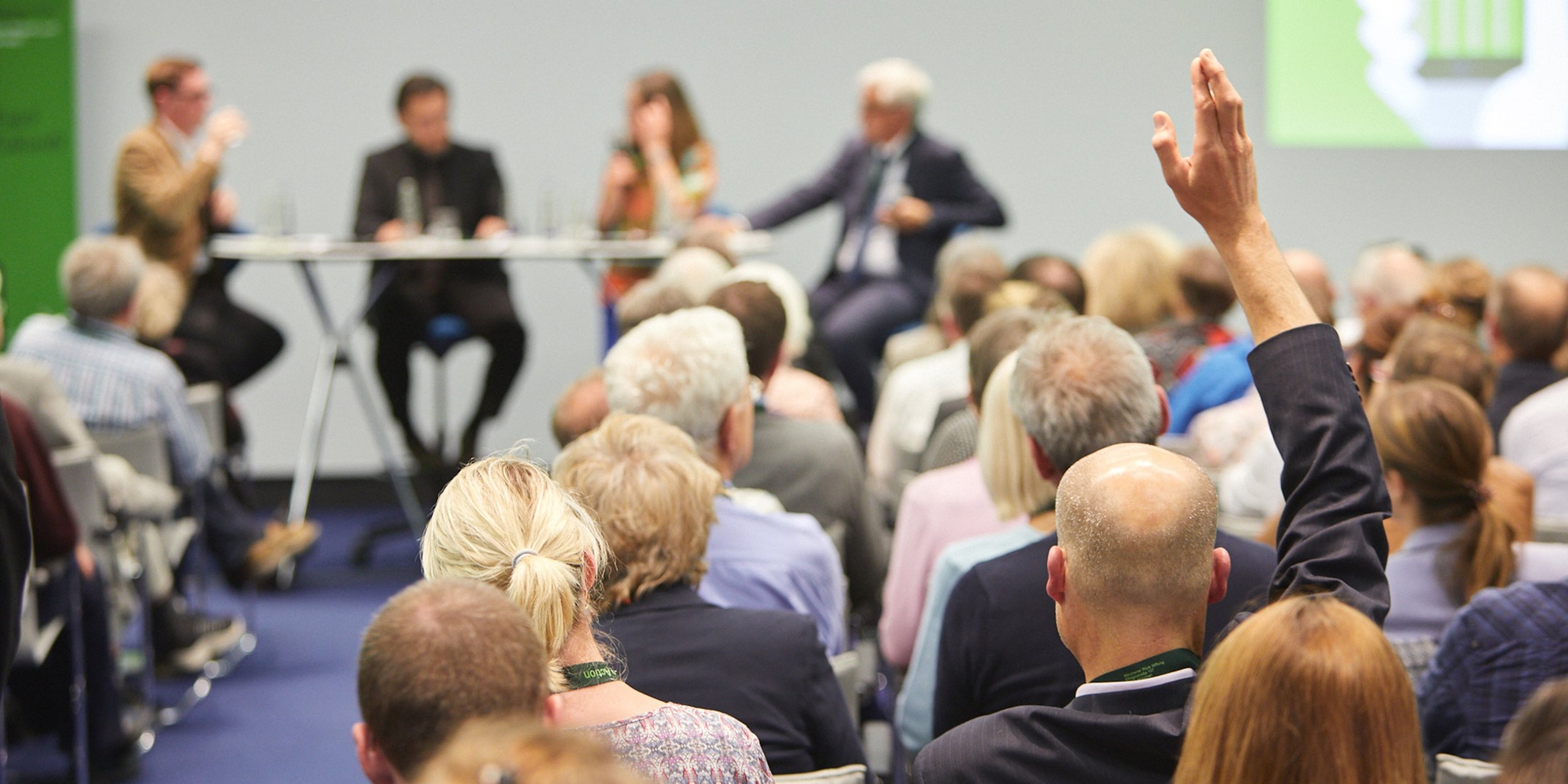
Climate protection and generational fairness
– the right to a good future
Dialogue Forum as part of the Münchner Klimaherbst 2023 on 26 October 2023
properties.trackTitle
properties.trackSubtitle
Climate change raises many questions of justice. One of them is: how can the necessary burdens and costs for more climate protection and adaptation be shared fairly between current and future generations? There is no simple solution to the conflicts of interest between young and old. This makes dialogue with each other even more important in order to create understanding for the other side and to avoid camp thinking.
In principle, there is no doubt that we all need to do more to protect the climate. However, people have different lifestyles, needs and financial means depending on their stage of life. The issue of intergenerational equity is about striking a balance between the social and economic interests of today and the future. The needs of people living now should be satisfied in such a way that they do not deprive future generations of their development opportunities. In terms of sustainability, it is imperative that the ecological consequences of economic development are also included in this perspective.
Lack of political will
"The concepts for more climate protection are in place, the only thing missing is the political will to achieve the 1.5-degree target," criticised Alisa Odobasic, who has been active in the climate protection movement "Fridays for Future (FFF)" in Munich for two years. In this context, she recalled the lignite mining in Lützerath in North Rhine-Westphalia, which was only implemented at the beginning of the year, and the weakened Climate Protection Act, which blurs the responsibilities for the sectoral climate targets in Germany.
The great injustice is that young and poor people and people in the Global South suffer the most from climate change, even though they have contributed the least to it. Young voices like her own also have to fight particularly hard to be heard at all. "This also puts a psychological strain on many younger people," Odobasic admitted. She expects the older generation to face up to their responsibility for climate change and be ready for change. "Instead, I often find that we as young activists are ridiculed and our expertise is denied."

Promising climate policy from below
Jörg Tremmel made it clear that states are not the best actors to tackle climate change. He is a professor at the Eberhard Karls University of Tübingen and Scientific Director of the Foundation for the Rights of Future Generations. "Governments are lobbyists for particular interests. It is unlikely that they will agree on common climate protection targets." He believes that one way to slow down climate change is for everyone to calculate their personal carbon footprint. This could reduce the gap between climate awareness and individual action. "We need grassroots approaches. A climate policy that does not involve the population will not work," he emphasised. In addition to the individual, companies also have a duty. Microsoft founder Bill Gates, for example, is setting a good example by not only making his company climate-neutral for the future, but also offsetting past emissions.
In the spirit of climate justice, Tremmel formulated a new categorical imperative: "If you are a company or an individual, reduce your carbon footprint to zero. If you live in Uganda or Ghana with a very small footprint, you have to make less effort than someone who is rich, flies a lot or eats meat." The moral requirement is the same for everyone, but the path to the goal is much further for some, which is not unfair. Only if someone really does not have the necessary financial means should this categorical imperative not be applied.
Prof Hubertus Bardt, Managing Director and Head of Science at the German Economic Institute in Cologne, emphasised economic strength as an important factor for climate protection. "From a position of economic strength, it is easier to mobilise money for climate protection or to pacify the resulting social conflicts," he said with conviction. Conflicting goals exist not only between prosperity and climate protection, but are also evident in the debate on nuclear power, for example.

Concern about economic disadvantages inhibits
Bardt also believes that focussing exclusively on climate protection is wrong. Rather, the aim is to lead the industry towards a climate-neutral future. This is why Professor Tremmel's call to simply reduce emissions to zero falls short. This is linked to fears of economic decline, which is why many countries do not prioritise climate protection. "China's quest for more growth has contributed significantly to the rise in greenhouse gas emissions in recent decades," he explained. Solutions must therefore be found, especially for economically emerging countries, for example through the use of new technologies. "The development in China must not happen to us in India again," he warned.
The question of the extent to which historical emissions should play a role in the issue of justice remained unresolved. While FFF activist Odobasic pointed out Germany's great responsibility for today's CO2 concentration in the atmosphere, Tremmel considers the year 1990 to be decisive from a climate ethics perspective. It was only then that a large majority of scientists realised how harmful increasing CO2 emissions were to the climate. "Blame can only arise if you do something wrong that you could have known better," he argued. Furthermore, some of the CO2 emissions emitted since industrialisation in 1850 have been reduced by natural effects. "Ignorance is no defence against punishment," Odobasic countered. Even without ill will, emissions are still in the atmosphere and we have to find a fair way to deal with them.

The right economic growth is crucial
Would renouncing future growth achieve anything? "Without growth, we will have distribution conflicts that are difficult to resolve, and then resources for climate protection will also become scarce. So that would be counterproductive," fears Bardt. However, growth should not mean using natural resources indefinitely or emitting CO2 at will.
Unfortunately, there is no ideal way to share the burden of climate change fairly between the generations. Interests and individual options are too diverse, especially as each generation is not a homogeneous group. However, it is up to each and every one of us to make a commitment to intergenerational justice and sustainable development. We cannot afford to carry on as before and hope that the state will sort it out.
Panelists:
Prof. Hubertus Bardt
Managing Director and Head of Science, Institut der deutschen Wirtschaft, Cologne
Alisa Odobasic
Fridays for Future, Munich
Prof. Jörg Tremmel
Stiftung für die Rechte zukünftiger Generationen, Eberhard Karls University, Tübingen
Moderator:
Julia Pfinder
Process and participation facilitator, systemic organisational consultant, Munich
Further information

The Münchner Klimaherbst series of events took place from 6 to 31 October 2023. This year's theme was "Fair enough?" and focused on climate and justice. Numerous lectures, films, excursions, discussions and much more took place throughout the city.
Klimaherbst.YOUTH is an additional programme from 6 October to 5 November 2023, aimed at children, young people aged 14 to 30 and teachers.
All events can be found online at www.klimaherbst.de/kalender, in the Klimaherbst.MAGAZINE and in the Klimaherbst.YOUTH folder, which is available in the city or can be ordered.

